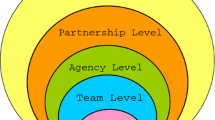Abstract
Women and minorities have consistently experienced marginalization and inequality in the United States, with low-income, immigrant and refugee women experiencing the most severe forms. This paper explores how we can restructure one area in which disparities exist, the primary healthcare system, to provide respectful, compassionate, accessible and adequate care to refugee and low-income women who are medically at-risk during pregnancy. This will be done by reviewing the Priscilla Project, an inner-city program that serves at-risk pregnant women in Buffalo, NY, including the history and persistence of disparities in healthcare, activities and impact of the program, and the uniquely contextualized program paradigm.
Similar content being viewed by others
References
Ennis, N. E., Hobfoll, S. E., & Schroder, K. E. (2000). Money doesn’t talk, it swears: How economic stress and resistance resources impact inner-city women’s depressive mood. American Journal of Community Psychology, 28, 149–173.
Hamelink, C. J. (2002). Social development, information and knowledge: Whatever happened to communication? Development, 45(4), 7–8.
International Migration and Human Rights. (2008). Challenges and opportunities on the threshold of the anniversary of the Universal Declaration of Human Rights. Global Migration Group, p. 84.
International Migration and Human Rights. (2008). Challenges and opportunities on the threshold of the anniversary of the Universal Declaration of Human Rights. Global Migration Group, p. 86.
International Migration and Human Rights. (2008). Challenges and opportunities on the threshold of the anniversary of the Universal Declaration of Human Rights. Global Migration Group, p. 85.
Isaiah. 58:6. (1989). The Holy Bible, New International Version. Grand Rapids: Zondervan
Lazarus, E. S. (1988). Theoretical considerations for the study of the doctor-patient relationship: Implications of a perinatal study. Medical Anthropology Quarterly, 2, 34–58.
Lazarus, E. S. (1990). Falling through the cracks: Contradictions and barriers to care in a prenatal clinic. Medical Anthropology, 12, 271.
Lazarus, E. S. (1990). Falling through the cracks: Contradictions and barriers to care in a prenatal clinic. Medical Anthropology, 12, 277.
Lazarus, E. S. (1994). What do women want?: Issues of choice, control, and class in pregnancy and childbirth. Medical Anthropology Quarterly, 8, 25–46.
Milligan, R., Wingrove, B. K., Richards, L., et al. (2002). Perceptions about prenatal care: Views of urban vulnerable groups. BMC Public Health, 2, 25.
Myers, B. L. (2006). Walking with the poor: Principles and practices of transformational development. Maryknoll, NY: Orbis Books.
White, S. (2006). The gender lens: A racial blinder? Progress in Development Studies, 6, 55–67.
White, S. A., & Nair, K. S. (1999). “The catalyst communicator: Facilitation without fear”. In S. White (Ed.), The art of facilitating participation: Releasing the power of grassroots communication. New Delhi: SAGE.
Acknowledgments
The Priscilla Project is partially funded by grants from the Community Foundation for Greater Buffalo, the Creative Ministries of the Presbyterian Women, the Unitarian Universalist Women’s Federation, and the Presbytery of Western New York. The authors would like to thank these organizations for their support, as well as the involvement and commitment of all of the women who participate in the Priscilla Project.
Author information
Authors and Affiliations
Corresponding author
Rights and permissions
About this article
Cite this article
Clifton, A.B.W., Cadzow, R. & Rowe, J. The Priscilla Project: Facilitating Equality and the Self-empowerment of At-risk Women in Healthcare Encounters. Gend. Issues 26, 141–151 (2009). https://doi.org/10.1007/s12147-009-9075-y
Published:
Issue Date:
DOI: https://doi.org/10.1007/s12147-009-9075-y



